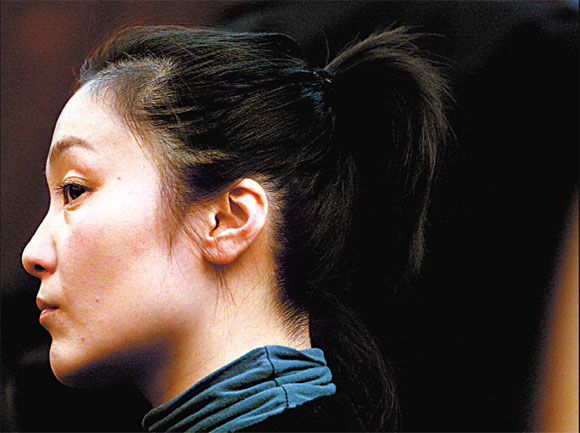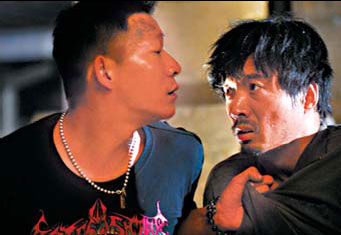Picking up the pace
|
Director Ma Liwen. Jiang Dong |
Award-winning director Ma Liwen was overjoyed: "Finally, something spicy has come into my life." A year ago, the renowned writer Liu Zhenyun chose Ma to direct Lost and Found (Wo Jiao Liuyuejin) - a film adapted from his latest novel.
The 37-year-old Ma established her name directing two small budget films about old women. Before the screenplay for Lost landed on her desk, she had been sent many scripts about family and elderly people. She wanted something different.
Set largely in Beijing's CBD, Lost follows Liu Yuejin, a construction site cook, as he searches for a lost bag. Along the way he encounters prostitutes, thieves, killers, corrupt officials, a real estate tycoon and an undercover cop. Writer Liu says the story is about how "a sheep eats wolves".
"Sheep and wolves are metaphors I make use of to express a new angle on today's world," he says. "Liu Yuejin exposes the absurd, irrational logic of some people."
Liu had initially envisioned Lost to be a light-hearted affair, but Ma sped up the rhythm and in the process, made the film darker.
"My previous works were very slow-paced, but that does not mean I can only do that type," the director says.
|
A scene from director Ma Liwen's Lost and Found, an adaptation of Liu Zhenyun's novel. File photo |
Another reason that Ma signed on for the project was her understanding of the characters.
"They are like my long-time-no-see relatives," she says.
A former singer, dancer, amateur writer and later an assistant to directors, Ma says that she identities with the characters.
Ma's father left her mother and younger brother when she was 9. She is still moved when she sees a father and daughter eating together at McDonald's.
While still a young girl but the eldest daughter, Ma helped her mother fix their broken roof. When her mother was at work, she had to move the coal into house, which left her covered in coal dust.
Her first film, The One Who Held Me Dearest in the World is Gone, was about a mother-daughter relationship, while Ma's follow-up, The Two of Us, is about the relationship between a girl and her old landlady.
Both films, while distinctly unsentimental, won audiences' hearts. Film critic Wang Zun says Ma's films do not dazzle immediately, but linger long in the mind.
During her teens, Ma wrote and painted, mostly about the people around her, such as a childhood playmate who drowned in river or a fat neighbor and his family.
After graduating from high school, she sang and danced in an art troupe in her hometown of Harbin, Heilongjiang province. Ma says that the dancing was just "moving your hands and legs together", but people loved her.
At 22, she left for Beijing and enrolled at the Central Academy of Drama. Eating in the canteen with classmates and discussing films with new friends are her happiest memories, she says.
After graduation, she found that holding a steady job in Beijing was harder than she had thought. She began shuffling among different crews, working as a log keeper or script-writer. It wasn't until she read Zhang Jie's novel - The One Who Held Me Dearest in the World is Gone - that she had the impulse to direct a film of her own.
A story about a woman missing her dead mother, Ma read the book over and over again and brought her worn-out copy to Zhang's home, asking for the author's permission to make it into a film.
The book was filled with Ma's notes, and she recited her favorite passages to Zhang. But the writer refused her request, saying she would not put her work under another person's control.
Ma left embarrassed but lingered outside Zhang's home to think it over. Before she walked away she slipped a note under the door, which said: "Anyway, I still love your work."
Later, an Italian journalist encouraged Zhang to let Ma have a go. After reading Ma's script, Zhang said: "Do it. I will not allow anyone else to direct it."

The film, as well as Ma's second film The Two of Us, were well received and helped her win the project Lost, which will premiere on Friday.
"After seeing her two works, you will find she makes a film because she loves life," writer Liu Zhenyun says. "That sets her apart from other directors."
The Two of Us won Ma the best director prize at 2002 Golden Rooster Festival, known as China's Academy Awards. Critic Wang later wrote that he was amazed that Ma, who has no professional background, strong networks or big financial backers, has made two films of such high quality.
"I am infatuated with the whole process of directing," Ma says.
"In studying the script you have to be a psychiatrist to feel the characters, and then you become a socialite, dealing with different people to find investment or other helpful things.
"You are a subcontractor later, gathering a group to work for something in your imagination.
"Filming is so fascinating that it trains you to know people, understand them and get yourself understood.
"If you tell a good story, everything will go good."
(China Daily 01/15/2008 page19)
















